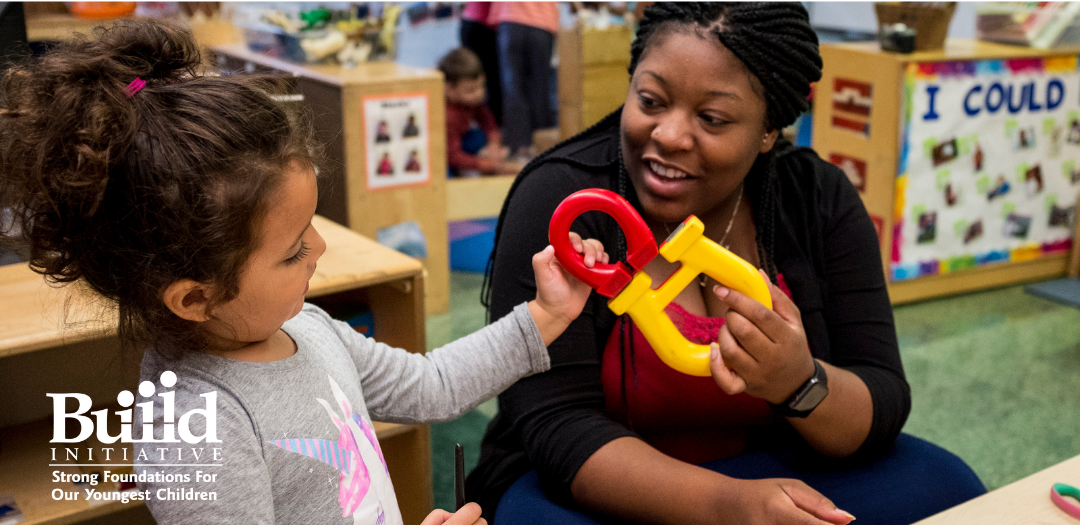The BUILD Initiative is Core Partner in the New National Early Care and Education Workforce Center

The National Early Care and Education (ECE) Workforce Center, created by the Administration for Children and Families, is a collaborative staffed by six core partners: the BUILD Initiative, Center for the Study of Child Care Employment at UC Berkeley, Child Trends, DE Institute for Excellence in Early Childhood at UDel, Institute for Early Education Leadership and Innovation at UMass Boston, and ZERO TO THREE. With a $30 million award over five years, the National ECE Workforce Center will coordinate and provide technical assistance and rigorous research to advance the recruitment and retainment of a diverse, qualified, and effective ECE workforce.
The BUILD Initiative will lead universal, targeted, and intensive technical assistance efforts with ZERO TO THREE, and many additional partners, through the team’s Learning through Action Consortium: All Our Kin, Child Care Services Association, EDvance, National Association for Family Child Care, Early Care & Education Pathways to Success, Prenatal to Five Fiscal Strategies, Start Early, National Workforce Registry Alliance, and the Donahue Institute. The focus and goals of the ECE Workforce Center are designed to examine and address the need for fundamental changes to recruitment, retention, career advancement, compensation, and ECE workplace policies.
The early care and education workforce – primarily women and often women of color and immigrants – has historically been undervalued and underpaid in the US education system. Their knowledge, skills, and well-being are undervalued because of longstanding racial and gender inequities. Exacerbated by the COVID-19 pandemic, the child care sector has lost almost 80,000 jobs, or about 7.5 percent of its workforce since early 2020.
The National ECE Workforce Center’s focus and goals are designed to examine and address the need for fundamental changes to career advancement systems, compensation, and ECE workplace policies. The partners aim to support leaders to advance change that centers early educators’ expertise and leadership across the full range of ECE settings (including family child care homes across Head Start, Child Care and Development Fund, state-funded preschool, and Individuals with Disabilities Education Act) and ECE systems (federal, state, local, and in tribes and territories).
Tonya Coston, BUILD’s new ECE Workforce Center Co-Director, stated, “I’m thrilled to be able to bring my experience and commitment to the National ECE Workforce Center to partner with other state and community leaders, educators, and families to promote thriving children and families.”
Since 2002, the BUILD Initiative has partnered with state leaders to create policies, infrastructure, and connections across agencies and organizations to advance comprehensive, high-quality, and equitable programs, services, and supports for young children, their families, and communities. BUILD helps leaders think and act systemically to address disparities and expand their networks to enhance their capacity to take action.
Read more National ECE Workforce Center here. Stay tuned for more information from the Center in the coming months!
Explore More
Collaborative Leadership and Power Lessons on Authentic Family and Community Partnerships
Video June 20, 2024
During this one-hour webinar, hosted in partnership with Vital Village Networks, you’ll witness the limitless wisdom and leadership that lives in our communities. Hear about best practices and lessons learned from prenatal-to-three (PN3) coalitions across the country that are working to shift and share power with parents and community partners. We’ll explore what it looks like to build trust and relationships while redesigning what it means to lead together for the health and wellbeing of our children.

Family Engagement
Report June 13, 2024
Family engagement at the state and local level is an essential component of high-quality, inclusive early childhood care and education (ECCE) programs and systems. Engaging families as partners during the early years allows parents and caregivers to establish strong connections that support their children’s development, well-being, and achievement long term.
Ideas for Incorporating Strategic Financing Efforts into Your PDG B5 Application
Report June 13, 2024
This resource outlines ideas for incorporating strategic financing efforts into your PDG B-5 application.
